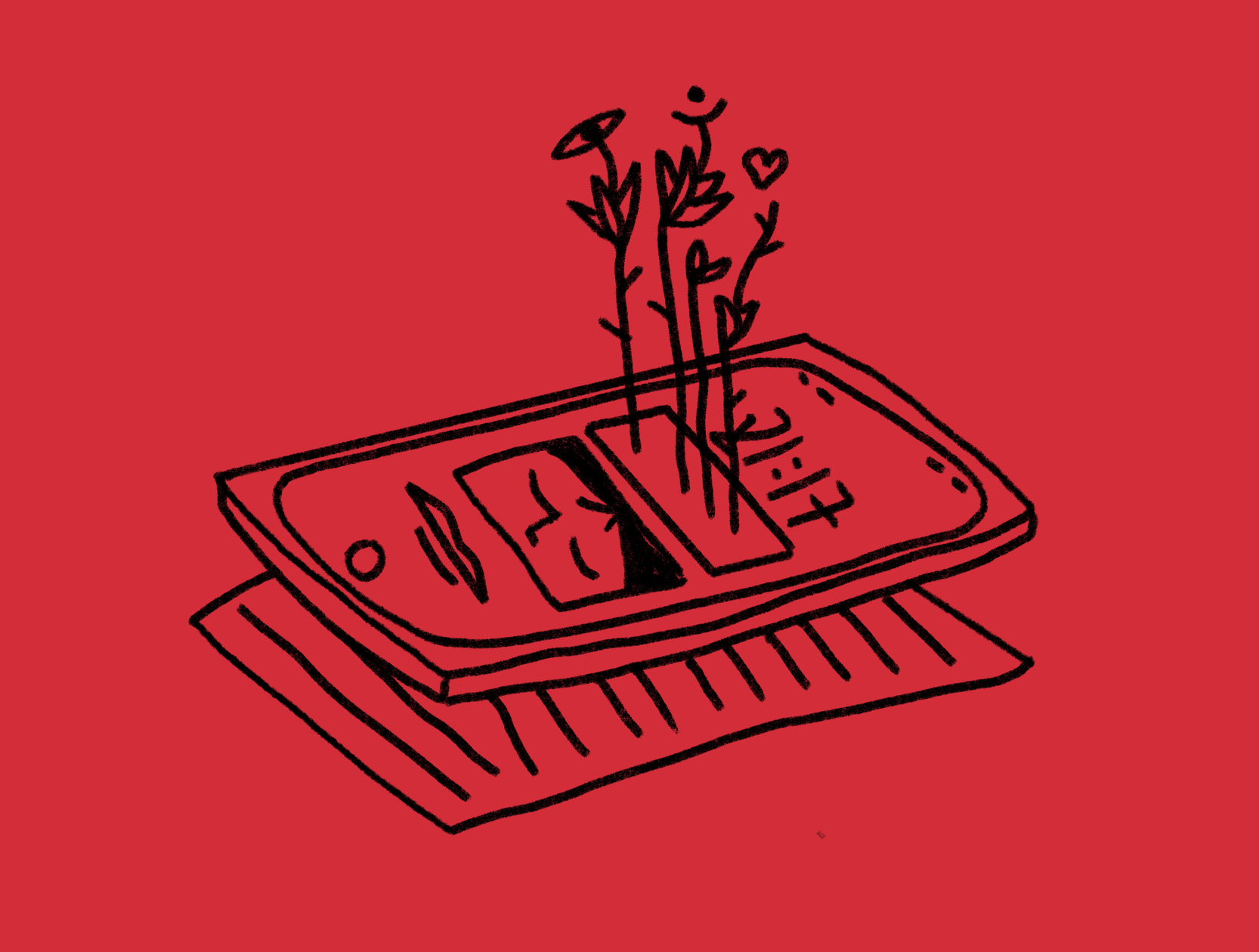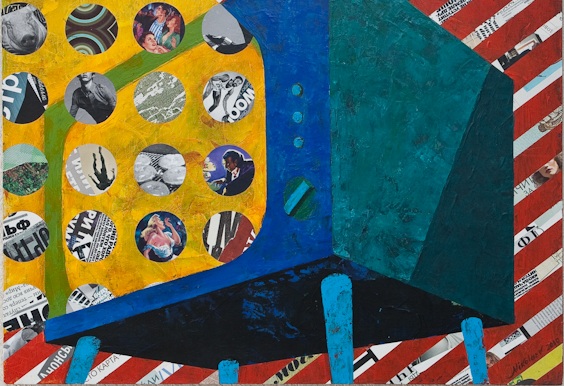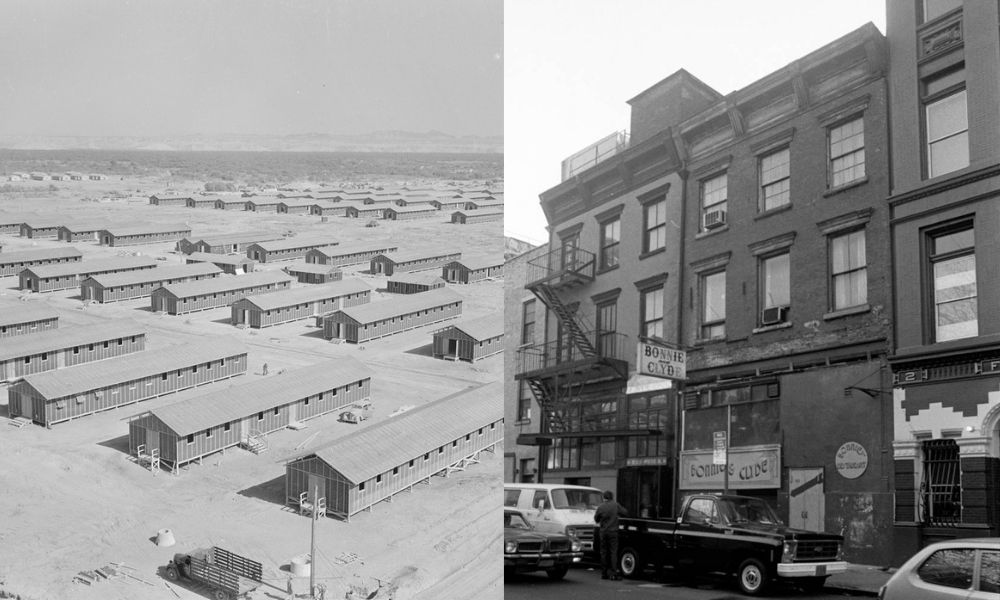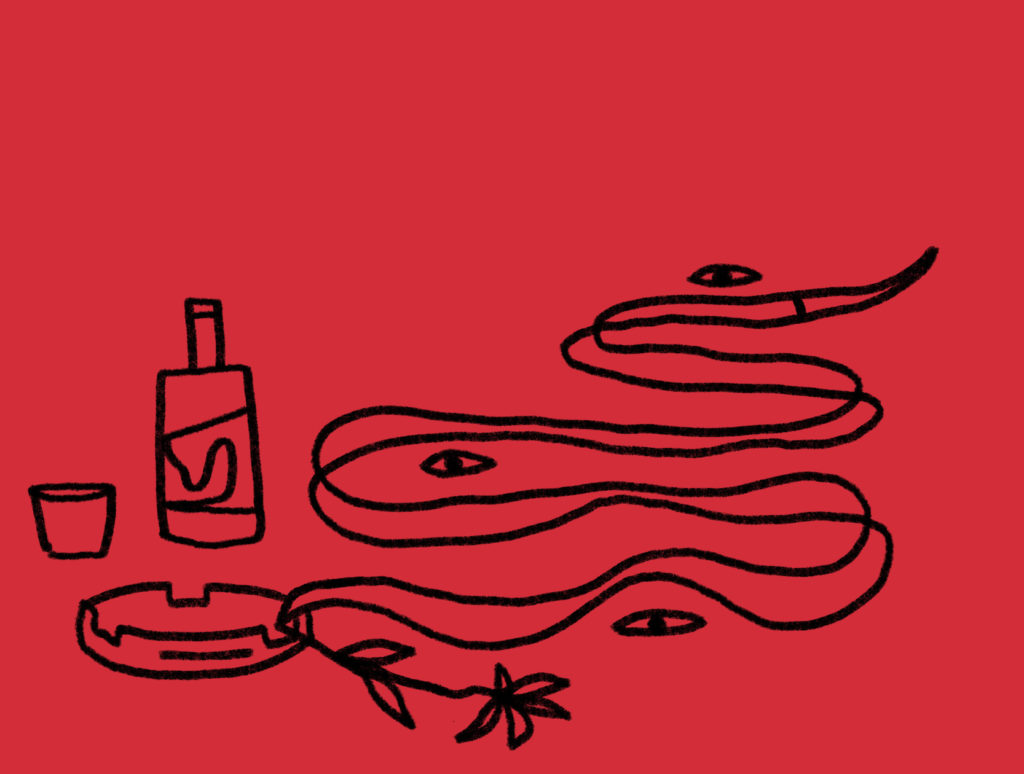The sea’s sunlit hues, the model-like beach goers that crowd the snack bar, the fruit from the south that tastes of the earth—they are totally unremarkable to her.

July 9, 2021
Editors’ Note: The following work of short fiction by Ghinwa Jawhari is part of the notebook I Want Sky, collecting prose, poems, and hybrid work celebrating Egyptian activist Sarah Hegazy, and the lives of all LGBTQ+ Arabs and people of the SWANA region and its diaspora. Edited by Mariam Bazeed and published as a part of a partnership with Mizna, the notebook will also be available as a print issue this summer, including pieces exclusive to that format. Continue reading work published in this series here.
I met Reem on Instagram during an attempt to push through an alcoholic phase. I admit I still called them phases though they occurred with dizzying frequency, the sober bouts so short in-between that I could tally them in days. It was day four. Whenever the urge to drink would strike, I’d down a slick sip from the flask on my desk, which I continued to refill with olive oil. Then I’d gag. I had decided to sweat through the final weeks of the thawing lakeside spring this way, nauseated and withdrawn, convinced that my mother was right all along: olive oil could cure anything. Eczema. Alcoholism. A bruised heart.
It was May, summer approaching with its sudden storms. Lightening would manifest from the stale air around noon. The thunder rattled my parents’ house until all three of us scrambled downstairs. A small, panicked herd. “Is everyone okay,” my dad would repeat, looking at my crumpled hands. “Everyone is okay!” my mother insisted for me. She said this often, or rather commanded it, optimistic but firm.
On day four, a bad downpour was uprooting the seedlings and bulbs my parents had carefully planted in the yard. They rushed out to save what was left. The peculiar beauty of this scene stunned me: their hunched, drenched forms, in love, handling the tiny greens with two-handed vigilance. Inevitably I thought of Beirut: viridescent bottles of Almaza pitched in the sand, a watermelon cooling in a stream, the emerald hills airbrushed like a stage set.
My parents smacked out triumphant high-fives in the sunroom when the plants were safe. As they dried off, I flew upstairs to the oil. In maroon lipstick I outlined my mouth, scrawled ‘EXTRA VIRGIN’ on the flask, and propped it between my naked legs. I posted the photo, casting a cipher. The notifications bubbled in succession on the lock screen. My thumb plucked through passively until it recovered a message. Someone I mutually followed but did not know.
She’d sent my post back to me. True? she wanted to know.
I fumbled with the phone. Started typing, then stopped.
Before I could respond with any mystery or sarcasm, she clarified: I mean you. Not the flask. I know that’s oil. That’s the point, isn’t it? I tried that once. Made me sick.
I liked both messages. Hesitantly, I put the phone away. The storm had picked up outside, and the wind had swirled our porch chairs into a corner. I watched our neighbor hurry inside from his parking spot across the street. When he saw me in the window, he waved, a gust of wind inverting his umbrella to a sharp V.
In two weeks, I’d book a flight to meet her.
*
We share a cramped chalet in Khalde in June.
The floor is consistently sandy, the concrete stoop extends directly onto the shore. Our drying clothes are strung on the line outside, where I imagine our voices float from the windows: my own broken Arabic, heavy-tongued, and Reem’s French-lilted English. That she is completely unmoved by Beirut stuns me. The sea’s sunlit hues, the model-like beach goers that crowd the snack bar, the fruit from the south that tastes of the earth—they are totally unremarkable to her. She’s lived here since her childhood. Beauty is ordinary now.
I did not bring any of my art supplies. I needed a true vacation, a point Reem insisted when we were discussing the trip. “No work for the capitalist American,” she’d warned. “You aren’t here to be productive.”
But the inability to create content makes me frantic, distracts me. So against her warning, mostly at night, I use anything I can get my hands on: hookah charcoals, sand, her eyelash glue, foil, fish spines from dinner, perforated shells, bottlecaps, her discarded contacts. I’d brought two Kodak disposable cameras along, newly in vogue like other relics from the ’90s, and had given the second camera to Reem.
We shoot photos for the entirety of the three weeks until the plastic wheels scroll and click beneath our thumbs indefinitely.
“So much better than the fucking iPhone,” she laughs now. She tosses the plastic camera to me. In the chalet, at the counter, she packs a puck with ground coffee and inserts it cleanly into the espresso machine. The horizon is orange sherbet through the window, the start of sunset. The coffee will keep us awake so we can swim without tourists.
“I like the iPhone,” I admit from the couch. “There’s an anxiety with the Kodak. Like, not knowing. Waiting.” I tuck the cameras into my purse. I leave in three days and the thought sours my stomach. I focus, stubbornly, on her ponytail as she works. “A limited number of tries.”
“But that’s more true to life.”
“I guess so.”
“Technology is a fantasy, remember?” She grins at me, steps through the mess to bring the coffee over. Last night’s kohl is smeared across her eyes and meets at the bridge of her nose. We were in bed until the afternoon. She hands me a steaming shot glass with the tips of her fingers. The ceramic cups are dirty, in the sink. “Tech’s problematic…wicked.”
“Tayib it’s not that bad.”
“Mbala.” She considers for a moment. On the table, she rearranges the shot glasses over a magazine, covering a man’s hips with one cup and his face with the other. The border of the tiny coffee table frames the shot. “It’s insidious,” she says as she works her phone over the cups. “False safety in anonymity. And a false infinity in what’s always available.”
“Both true.”
“I’m always right,” she reminds me. She adjusts the colors and saturation of the photo, the man’s eyes and groin neatly censored by the dark liquid. The shot glasses now are too hot to touch. I read the photo caption as she types it: ‘indecency addressed.’
*
When we first met on Instagram, Reem would pair some non-committal photo with an equally drab quote. A latte with lipstick on the rim got ‘but first, coffee.’ A filtered cityscape horizon got ‘take me back.’ Her cat, a majestic feral tom adorned with the bowtie he hated, got a heart-eyes emoji. It was insincere, styrofoam photography: single use, corruptive. It took zero risks, made no statement, yet hijacked the platform for likes and followers. None of this would’ve bothered me if Reem’s bio hadn’t declared, in audacious caps, ARTIST. Vacant lifestyle esthetics were all she posted when we met. It had provoked me.
My own page was littered with gin tastings, open-mouthed hoots near phallic vegetables, collaged and censored nudes, glam graffiti I’d penned myself, political cartoons, gaudy sex jokes, videos of chalk murals, shots of my uncle’s mustache, deliberately hideous selfies. Every so often, a germ post would multiply my following like bacteria overnight, but it was still nowhere near Reem’s. In my most recent post, my unpainted toes gripped the TV remote, the stubble on my legs numbered and connected in pen. The caption read, ‘this programming made possible through contributions from your ape ancestors. thanks ya habayeb.’ In the far corner of the shot, my father’s raised brow and tense lip. Reem’s comment, on the day we’d met: Thank them for me.
“You’re not an artist,” I ventured when I’d arrived in Beirut. I said this gently but seething. Baseline-drunk-honest. Still groggy from the long flights and the thrill of meeting her. She was loud and small in person, her body visibly soft through her clothes. Girly. She could run and shuttle luggage on her shoulders in five-inch heels.
My mother, for years, wrote off my androgyny as an unfortunate byproduct of a flat chest. Her theory had legitimacy to the naked eye. I shed entire looks year to year, my body a tall, featureless mannequin. Oddly, the contrast I felt near Reem comforted me. It was as if I needed to look different to be noticed near her. By her.
We’d been talking for a while by then. She was driving us to the chalet. My luggage clattered in the trunk as she swerved and darted between cars. “You aren’t creating,” I continued. “You just reproduce.”
“Wallah!” Her red lips parted in mock shock. She stuck her tongue out, pleased with the challenge. “What am I going to tell the seven hundred thousand followers who disagree with you, Huda?” I watched her casually flip off a truck driver, as if in greeting, before zooming ahead of him.
“Creation takes courage,” I continued, drowsy from the stench of gasoline. “Like it’s uncomfortable. Maybe ugly. Or maybe people don’t wanna see it, but it needs to be in the world.”
She snorted, shot her brows all the way over her sunglasses. The yellow dress she wore undermined any of her seriousness. “Huda,” she said, as if we’d argued for hours and she needed to truly explain. “Huda.” She pulled into the lot, unlocked the doors, turned to me. Her close-lipped smile, jaunty but rehearsed, reminded me of the photos she’d shot earlier in the year with Adam, an actor from Tripoli. “It’s all just fantasy,” she said, settling it. “Fake.”
But her photos, I noticed, immediately changed.
*
“Were there others?” Reem asks me often. The concept of ‘others’ enrages her. When I mention this is very Lebanese, she says I am wrong—that it is European to want to possess something, and the Lebanese have copied it—but later she’ll agree. It is Lebanese. “We reinvented it and made it better. Our jealousy.”
“Just one,” I say. Over and over. “Just one,” but she doesn’t soften. “And I guess a crush. In middle school but that—I mean, it was middle school.”
“Very sexy.”
“Shut up.”
“What about the ‘one’? When was that?”
“It ended right before I met you. In grad school.” I put my cigarette out and turn to my stomach. Outside, a woman is teaching her daughter to swim, their synchronized arms dipping into the waiting ocean. “She was married.”
“Do you wish I was married?”
My mascara has left black lines on her cheeks, thin as whiskers. She turns to me when I rub them off with my thumb. Yes, I think, I do.
*
Above the water, white stars brighten the asphalt of space. Small halos twinkle around the larger ones. I keep my eyes skyward, unable to watch Reem undress before she dives in. Her “Yallah!” cuts the air. She splashes at me, hoots. I shiver as I step out of my shorts.
I walk in until my hips are submerged, then thumb my flask before offering it to her. She ticks her head back to refuse. When I push it to my mouth, she looks at me strangely.
“Be honest,” she dares me, dipping her chin into the water. “Do you need to drink to be with me?”
“Reem.”
“Or with any woman?” She wades to me with her hand outstretched for the flask. She drinks without looking at me, masks the start of a whimper with a hiccup. I see it then, a twitch in her arms. She wants to dump the whiskey in the water, but she doesn’t, resorting instead to her ruthless neutrality. “I’m not special, right?” When she hands it to me, she nearly grins.
Reem is the first person to ever call me an alcoholic to my face. A week ago, she’d flicked the word at me easily in a bar, like brunette or American, and then ordered another round for us.
“You’re not special.”
“Knew it.” Her teeth glisten, a bit of bourbon still glazing the corner of her mouth.
“What should we do?”
“Swim,” she commands over her shoulder. “Bas don’t go too far out. No lifeguard.”
In the distance, the waves resemble moving black hills. I am afraid that I can’t see through the water, but Reem takes to it without hesitation. She dives confidently and kicks up little fountains with each stroke. I want to swim like her, carelessly, but I’m petrified. My feet won’t budge from their soft pockets of sand. I think of the saltwater predators and parasites that share the sea with us, and it spooks me into finishing what is left in the flask. Only moments later, when I start to feel loose and warm, do I notice the water lapping gently at my stomach. Reem has already swam a few laps by then. Her body curls over the surface and pushes back inside. The backdrop of the waves roar over her; there is no sound to her movements, no disturbance or alarm. She is part of the water. I watch her, not moving, and it’s only later that I notice the flask has fallen from me and disappeared. She pulls up near me and pushes the wet hair from her face. Then she cups mine. “Shu?” she wants to know. “Are you afraid?”



